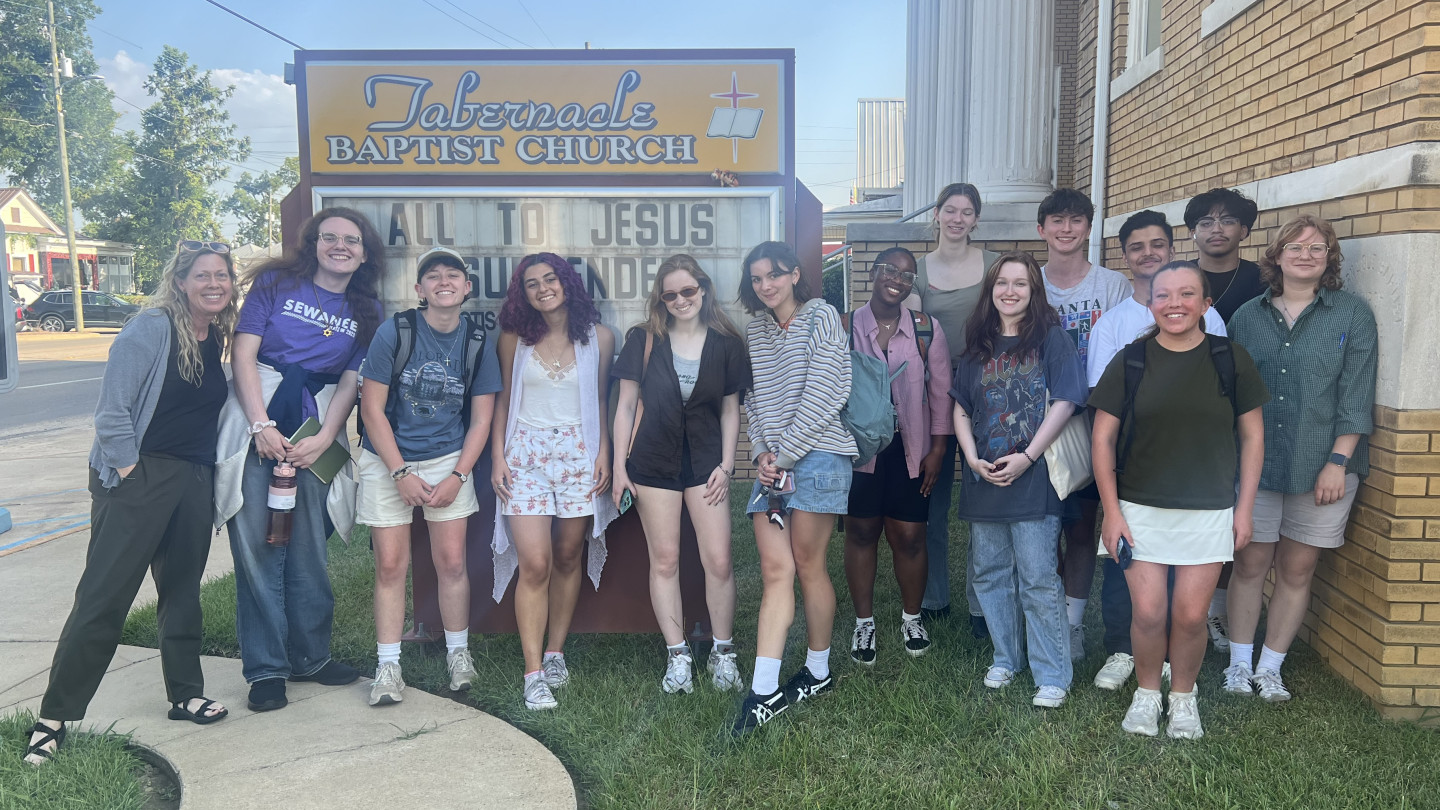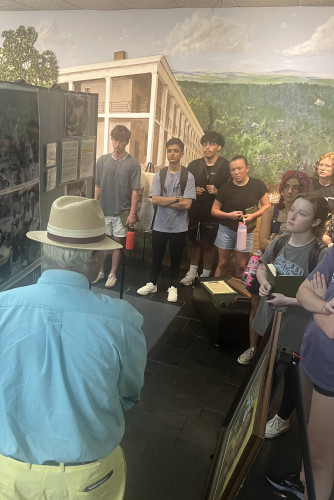For the second year in a row, the Office of Civic Engagement, specifically the outreach & service-away programs, was excited to offer a Finding Your Place (FYP) class for first-year students at Sewanee.
FYP students arrived two weeks before other first-year students in order to immerse themselves in learning about self, place, and what it means to live, work, and serve in community. The program teaches students to think critically about how each of us fits into, affects, and is affected by the different places in our lives.
From Sewanee to Selma: Identities, Stories, and Civic Engagement allowed students to not only take a deep look into Sewanee’s history but also to partner with the city of Selma, Alabama. Similar to the fall 2023 class, students were challenged to consider and reflect on their own identities and the lived experiences they bring with them as new members of the Sewanee community, while also examining the lived experiences of diverse community members in Sewanee and Selma.
During the first few days on campus, students listened to Dr. Andy Maginn from the history department share his research on Sewanee’s history and more specifically on some of its founding funders and their ties to Alabama and the Selma region. Dr. Lydia Reinig, director of the dialogue across difference program, taught the students how to actively and wholeheartedly listen to people’s different and unique stories and perspectives in order to be better informed and prepared to hear from community leaders in Sewanee, the surrounding community, and in Selma. From there, the students were treated to a deep dive into the founding and historical significance of the Highlander Folk School in Grundy County, thanks to the incredible stories and memories from Mr. Denis Marlowe and Mr. Oliver Jervis. Students were invited into the old library of the Highlander School, where Martin Luther King, Jr. once taught and inspired young civil rights activists including Rosa Parks and John Lewis.

A generous grant from the McCrickard Faculty Development Fund once again allowed the class to travel to Selma for three nights to engage in experiential learning and relationship building with community leaders. Students met with leaders from different faith traditions to learn about their role in the Selma Voting Rights Movement, heard from Selma artists who build community through a variety of mediums, listened to stories from Black business owners in Selma, and visited the Equal Justice Initiative and Legacy Museum and Memorial in Montgomery. As with last year, a highlight of the experience was hearing directly from Foot Soldiers who recounted stories from Bloody Sunday and their memories from Selma during the Voting Rights Movement. From Lily Stokesbury’s (C’28) final reflection paper:
"Selma taught me about the strength of all the Foot Soldiers. It taught me about the courage you find within your community. It taught me that strength is in numbers, because fighting together is stronger than fighting alone. It taught me bravery came in the form of nine-year old girls singing freedom songs. The importance of community is so prevalent in Selma. It was important back in 1965, and it’s important now in the Reflections Coffee Shop and Historic Tabernacle Baptist Church."
The class worked closely with Sewanee’s Roberson Project on Slavery, Race, and Reconciliation to learn more about Sewanee’s history, including spending time in Sewanee’s cemeteries and learning more about St. Mark’s, the historic Black community along Sewanee’s Heritage Trail. The class was invited to spend time with the St. Mark’s community and work in their community garden. From Henry Varden (C’28):
"I have always had a place in my heart for small communities, and Sewanee is no exception. Through the opportunity…to interact with the lovely people in the St. Mark’s community, I have learned how amazing that community is, as well as how deep their history is. Not just through learning about the history itself, but seeing the mark of it upon the physical community as well as the memories of the community members is, I feel, just as important as simply learning about its impacts. I will be taking care to acknowledge their perspectives and learn as much as I can, and try to [stay] in connection with them."
The course was again an overwhelming success, allowing students to gain a deeper understanding and appreciation for the stories that shape all of our lives. Students learned more about the important and often overlooked history of their new Sewanee home and the crucial role of Black communities and young people in the Voting Rights Movement over fifty years ago. They learned about perspective taking and perspective sharing and the importance of both. As Lily also wrote in her final paper:
"I don’t know how you could enter this class and not leave with your perspective altered. I know mine has. Like I said, I feel like I had my eyes closed before, but they’re open now.  Throughout FYP, we learned how to listen with intention. We learned how to enter spaces with the objective of listening, to be of service if asked, but never with the idea that we could be the saviors. I learned about the diverse perspectives of so many in Selma. I had the same experience at Sewanee in Grundy and Marion counties. We visited the Heritage Center and saw its immense impact on Mr. Jervis and the people with him. Seeing other people so passionate, also brought to tears by the hurt others have experienced, helped me find part of myself. The thing with perspective taking is once you open yourself up to learning someone else’s perspective, you open up to adjusting your own. I am going to carry myself in a new way now, with new insights on the world. You learn something from everyone. Your life experiences shape your perspective. And sharing your perspective is going to change other people’s, too."
Throughout FYP, we learned how to listen with intention. We learned how to enter spaces with the objective of listening, to be of service if asked, but never with the idea that we could be the saviors. I learned about the diverse perspectives of so many in Selma. I had the same experience at Sewanee in Grundy and Marion counties. We visited the Heritage Center and saw its immense impact on Mr. Jervis and the people with him. Seeing other people so passionate, also brought to tears by the hurt others have experienced, helped me find part of myself. The thing with perspective taking is once you open yourself up to learning someone else’s perspective, you open up to adjusting your own. I am going to carry myself in a new way now, with new insights on the world. You learn something from everyone. Your life experiences shape your perspective. And sharing your perspective is going to change other people’s, too."

